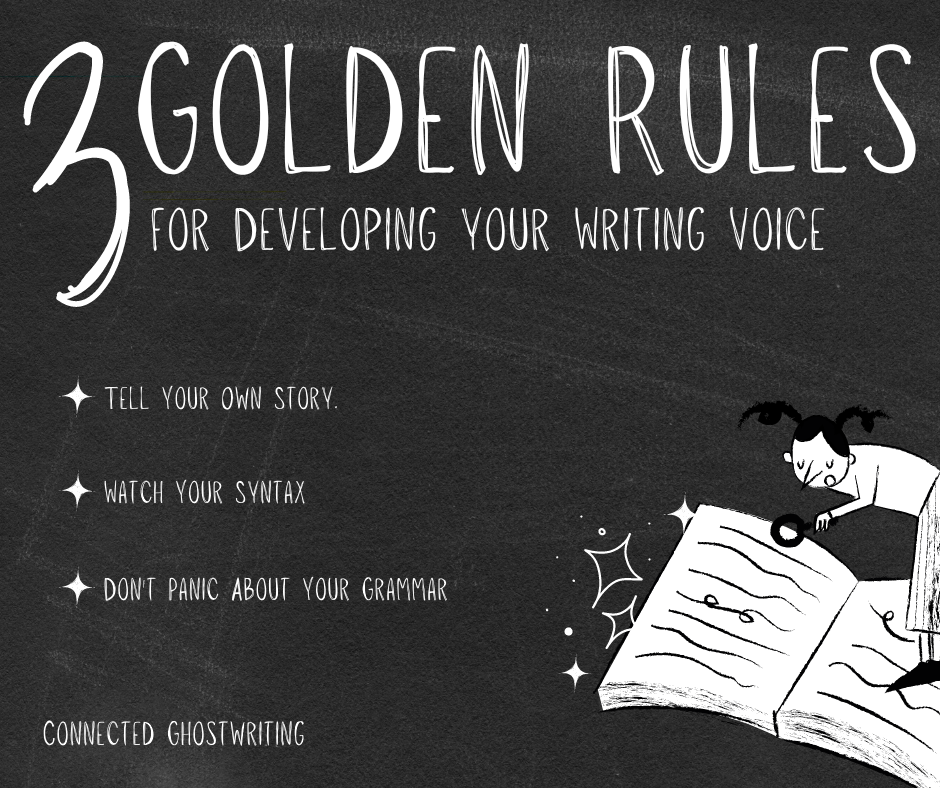So, you want to become a blogger. Or maybe write a newspaper op-ed or material for a podcast. Or maybe even a book. Your material will be nonfiction, so you want it to be crammed with lots of solid information.
And that’s great—your readers will be looking for solid information. But they’ll be looking for something else as well: They’ll be looking for a writing style and a unique voice that will guide them through that information. They’ll be looking for a narrative voice that will create a story all its own, with character, conflict, and plot, the main ingredients of a novel or short story. They’ll be looking for syntax, terms, and sentence structure that are readily understood and effectively convey the author’s thesis and point of view.
I know that sounds like a lot. But as you embark on your writing journey and find your writing voice, you’ll see that finding all of these elements and incorporating them into your work is not quite the juggling act it sounds like. In fact, by following these writing tips, you might find that author’s voice that’s been eluding you, and you’ll be able to fit the “you” in your work.
The Writer’s Voice

So, what will be your distinct voice on the published page? Will you have the sparse, elegant, yet romantic style of Ernest Hemingway? The wildly imaginative and adventurous technique of Neil Gaiman? The particular fashion of your own favorite author? Or something completely different? You should concentrate on three things to help find your own style in your own writing:
Tell Your Own Story
Nothing will make your writing more “yours” than your own stories, particularly if your book has to do with some sort of self-development. (Also, who doesn’t love to read a good story?)
Watch Your Syntax
Pay close attention to the syntax, or organization of words, you use to convey each thought. As we begin to examine this issue, let me ask you a question: Is writing an art or a craft? I’ve been wrestling with this question for years, and the best answer I can come up with is that it’s both. The art portion comes from the imagination it takes to create a story in the first place, even if the story we’re telling is something that’s actually happened to us. The craft of writing, though, comes in the small details, particularly in word choice and sentence structure. It’s where the rubber meets the road in writing—after all, if your reader doesn’t understand your sentences, your writing goes nowhere. And if each sentence isn’t as powerful and impactful as possible, you won’t find that unique style for which you’re searching.
Don’t Panic About Your Grammar
Sometimes, when writing with your distinct voice, your grammar will fall somewhere south of pristine. That’s okay! A fellow ghostwriter, Kent Sanders recently said in a Facebook post “But keep in mind that an awful lot of technically “correct” writing is extremely boring. There’s no viewpoint, nothing interesting, and nothing surprising.” If you worry too much bout perfect grammar you’ll lose some of what makes you, you. Third, draw a distinction between drafting and writing. I’ll let you in on a secret: composing your first draft isn’t writing. It’s drafting. It’s turning your head sideways and shaking a whole mess of ideas onto paper. Revision is the essence of the writing process, and it’s where actual writing takes place. We’ll be looking at the value of writing a lousy draft in a moment.
Tell a Story
Some people—people who know absolutely nothing about writing—are just natural storytellers. They mesmerize people with their ability to regale us with tales from their lives. We can take a lesson from these people: Everyone loves a good story, and whether you believe it or not, you’re FULL of great stories that people want to hear, particularly stories about how you improved your life by solving problems.
A story, whether it’s a short story or a mammoth novel, is simply this: The author creates a real, living, breathing character with whom the reader identifies. That character is given a conflict (not just a problem, but a conflict, best described by New York Times best-selling author Steve Berry as “a conflict of the human heart”). Then, the way that character goes about solving the problem forms a plot.
That’s it. It’s that simple.
Whether you use first-person narrative or third person; whether you’re writing journalistically or employing creative writing (see once again Ernest Hemingway and Neil Gaiman, respectively), whatever each character’s voice may sound like, tell a story about yourself and stick to the simple formula described above. Telling a story that’s yours, a story about yourself, might be the quickest route to keeping you in your writing, because after all, what’s more “you” than relating a story that you’ve lived through? And don’t be afraid to embellish your story with the elements of fiction writing: setting, description, supporting characters, and the like (why let fiction writers have all the fun?). Not only will the story keep you in your writing, but it will lend a “your voice” feel to your work, something that’s tremendously in vogue these days. And the more you write about something familiar to you, the better writer you will be.
Sentences and Syntax
Here are two sentences. Which is better?
- The puppy, ebullient with joy and its tail wagging rapidly, bounded across the lawn and leaped into my outstretched arms.
- The dog jumped into my arms.
If you said sentence one is better…you may be right. Then again, in the context of a particular piece of writing, sentence two might be preferable. Who’s to say?
English is a magnificent language. It allows for different styles, different voices, different points of emphasis, and countless shades of meaning depending on which word you choose (such as “puppy” over “dog,” or “leaped” over “jumped’). Just remember that the flavor of your writing, how someone “hears” a writer’s voice in their head as they read, is largely dependent upon how you form your sentences.
In the above example, you might think sentence one is the better sentence because it has the more sophisticated language. That’s true. But if I were writing something in “my own voice,” sentence two would come closer to the mark. Again, though, it would largely depend on the anecdote I was telling, the context of the sentence, and the reaction I was trying to elicit from my reader. The best advice I can give you about crafting a sentence and the syntax you choose is this: Write sentences and use words that reflect the thought you’re trying to convey as exactly and precisely as possible. If the sentences represent your thoughts precisely, how can they help but contain your own voice?
Write a Lousy Draft

As a professional writer and writing instructor with tons of experience of teaching, here’s one of my strongest pieces of writing advice:
I implore you to write a lousy draft.
Or at least, give yourselves room to write a lousy draft. (And hey. An editor is going to look at it anyway, right?)
You see, drafts are supposed to be lousy. They’re drafts. They’re not actual writing. As mentioned, they’re ideas spilled out on paper. Once we revise them, then they’re writing. This is why I don’t think there’s any such thing as writer’s block. If you can make yourself write a draft, no matter how lousy, I promise you that you can find your way to write a finished piece in your own voice.
Give yourself some writing prompts or exercise some free writing (in which you let yourself go where the drafting takes you), and more often than not, you’ll find that you’ve struck upon at least one idea that can be developed into a worthwhile piece of writing. If nothing else, it will give you practice in developing your own writer’s voice.
Get Writing!
One more piece of writing advice. The only way to find your own voice in writing is to write. A lot. The more you do it, the more it will come to you. Eventually, writing in your own voice will become second nature, and you’ll be pumping out blogs, op-eds, podcasts, and books by the page. Just remember: The people who say that they tried to write but discovered they couldn’t do it are usually the people who simply gave up way too soon.
If you’re looking for support as you develop your unique writing voice, we’re here for you! Download our Book Writing Starter Kit today to help develop your ideal reader, and start planning your next book!
Need more support? Contact us today and learn how the Connected Ghostwriting team can help you!


